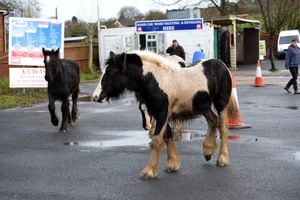Bailiffs brought in to tackle stray Wolverhampton horses
Bailiffs are being brought in to tackle horses roaming free in a Black Country borough, it has been announced.

Wolverhampton council is the latest authority in the region to bring in a firm to clear roads and open spaces of tethered and stray horses.
The authority will use Bridgnorth-based Equine Emergency Services on a temporary basis to try and get a grip on illegal fly-grazing.
Express & Star comment: Responsibility needed over horse ownership
The firm, already used by Dudley and Sandwell councils, charges owners £400 to reclaim their animals.
Danielle Taylor, from Wolverhampton council, said: “We are looking to appoint this position to control illegal fly grazing and associated nuisance with irresponsible horse ownership in Wolverhampton.”
The issue of illegal fly-grazing in the Black Country was raised in Parliament by Pat McFadden, MP for Wolverhampton South East, four years ago.
He claimed horses were being found dead tethered to posts, or were left in such bad condition they had to be put down.
He said laws should be simplified for councils to remove the animals.
Welcoming the council’s move he said: “There has been a long-term problem of fly-grazing of horses in some parts of the Black Country.
“It is often difficult to know who the horse belongs to and difficult to track the owner down when there is a problem.
“It is a good idea that the council takes action to be able to remove these horses when there is a problem.
“It also puts an onus an owners to come forward and exercise responsibility.”
The British Horse Society said the ‘consistent action’ of councils across the Black Country meant owners could not escape enforcement.
Gemma Stanford, director of welfare, said: “Bailiffs are commonly used by councils as they have the required equipment and expertise to move horses to a place of safety.
“The cost of dealing with unlawfully grazed horses can be substantial, often running into many thousands of pounds.
“Additionally, horses that are not properly cared for can quickly become a welfare concern. Cases of neglected and starving horses are frequently due to abandonment.”
The society recently microchipped 105 horses to help owners comply with legislation while also castrated 26 stallions.
Ms Stanford added: “The British Horse Society aim is to improve equine welfare through proactive education and we support the council’s efforts to enforce legislation that was designed to improve equine welfare.”





